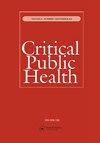Frailty goes viral: a critical discourse analysis of COVID-19 national clinical guidelines in the United Kingdom
IF 2.3
3区 医学
Q2 PUBLIC, ENVIRONMENTAL & OCCUPATIONAL HEALTH
引用次数: 0
Abstract
ABSTRACT This paper explores how the rationing of medical care for older people by frailty score was justified and operationalised in the UK during the COVID-19 pandemic. COVID-19 was expected to overwhelm the National Health Service (NHS) in the UK. In March 2020, the National Institute for Health and Care Excellence (NICE) published the ‘COVID-19 rapid guideline: critical care in adults’, which advised that clinicians use the Clinical Frailty Score (CFS) to inform decisions about which patients over the age of 65 should be offered ventilatory support. We present a Foucauldian Critical Discourse Analysis of this guidance and the supporting online resources. Analysis shows how the guidance merchandises the CFS as a quick and easy-to-use technology that reduces social and physical complexity into a clinical score. This stratifies older people by frailty score and permits the allocation of resources along these lines. We show how this is justified through epidemiological discourses of risk, which are merged with the language of individual mortality prediction. We discuss the proceduralisation of the CFS alongside a growing body of research that problematises its application in resource allocation. We argue that the pandemic has increased the use of the concept of frailty and that this effectively obfuscates the concept’s limitations and ambiguities; the ageism implicit in the response to COVID-19 in the UK; and the relative resource scarcity facing the UK’s NHS.虚弱像病毒一样传播:对英国COVID-19国家临床指南的批判性话语分析
本文探讨了在2019冠状病毒病大流行期间,英国如何通过虚弱评分为老年人提供医疗服务的合理性和可操作性。预计2019冠状病毒病将使英国国家医疗服务体系不堪重负。2020年3月,英国国家卫生与护理卓越研究所(NICE)发布了《COVID-19快速指南:成人重症监护》,建议临床医生使用临床虚弱评分(CFS)来决定哪些65岁以上的患者应该获得呼吸机支持。我们提出了福柯式的批评话语分析,以此作为指导和支持的在线资源。分析表明,该指南如何将CFS推销为一种快速易用的技术,将社会和物理复杂性降低为临床评分。这种方法将老年人按虚弱程度进行分层,并允许按照这些方式分配资源。我们通过流行病学的风险论述来证明这是合理的,这些论述与个人死亡率预测的语言相结合。我们讨论了CFS的程序化以及越来越多的研究,这些研究对其在资源分配中的应用提出了问题。我们认为,大流行病增加了脆弱性概念的使用,这有效地混淆了这一概念的局限性和模糊性;英国应对COVID-19中隐含的年龄歧视;以及英国国民医疗服务体系面临的相对资源短缺。
本文章由计算机程序翻译,如有差异,请以英文原文为准。
求助全文
约1分钟内获得全文
求助全文
来源期刊

Critical Public Health
Multiple-
CiteScore
5.90
自引率
7.10%
发文量
36
期刊介绍:
Critical Public Health (CPH) is a respected peer-review journal for researchers and practitioners working in public health, health promotion and related fields. It brings together international scholarship to provide critical analyses of theory and practice, reviews of literature and explorations of new ways of working. The journal publishes high quality work that is open and critical in perspective and which reports on current research and debates in the field. CPH encourages an interdisciplinary focus and features innovative analyses. It is committed to exploring and debating issues of equity and social justice; in particular, issues of sexism, racism and other forms of oppression.
 求助内容:
求助内容: 应助结果提醒方式:
应助结果提醒方式:


